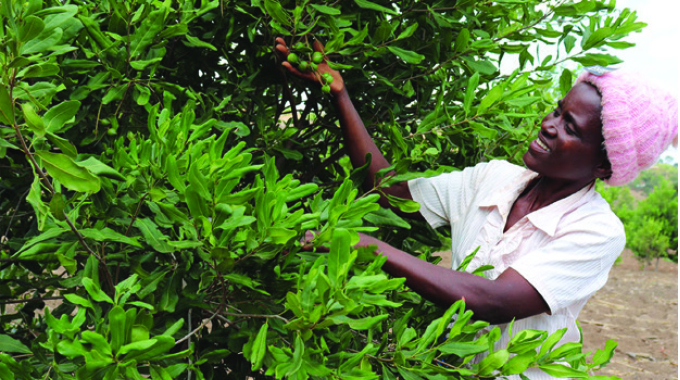Macadamia farmers struggle to get funding

Business Reporter
Macadamia nut farmers in Zimbabwe are struggling to access funding to support production of the lucrative crop, despite its huge potential to generate foreign currency through exports, an industry official said.
Mr James Maisiri, the secretary general of Macadamia Association of Zimbabwe, an official group that represents local producers, said farmers had hoped they would benefit from the recently launched US$30 million Horticulture Export Revolving Facility, “but all the engagements with relevant authorities have not been helpful.”
The funding was earmarked from the Special Drawing Rights (SDRs) allocation of US$961 million to Zimbabwe by the International Monetary Fund to help economies recover from the effects of the coronavirus pandemic.
The fund is aimed at enabling local farmers to boost production and tackling challenges related to unavailability and lack of access to appropriately structured financing for short to long-term expenditures.
“We made our submission to the Horticulture Development Council in Harare but did not get the attention we had hoped. It appears they are focusing on flowers but we believe as macadamia farmers, we have the potential to grow the country’s exports but we are lacking funding,” Mr Maisiri said in an interview on Wednesday.
He said the farmers also directly approached some of the banks appointed to administer the facility but the conditions “are tough for the majority of our members.” “It is like being told that we have no money for you,” added Mr Maisiri.
No comment could be immediately obtained from HDC.
Finance and Economic Development Minister Prof Mtuli Ncube said the Horticulture Export Revolving Fund had the potential to close the funding gap and spearhead increased productivity and finance bankable projects with a focus on value addition.
Such strategic deployment of resources, he added, will ensure that Zimbabwe’s Vision 2030 remains on course as the country targets an upper middle-income society.
“Through the risk sharing and co-financing model, banking institutions shall conduct their normal credit assessments and due diligence. “To this end, the Government, Reserve Bank of Zimbabwe, FBC Bank, NMB Bank, CABS Bank and the AFC Land and Development Bank have signed the Memorandum of Agreement and Term Sheet for the Horticulture Export Revolving Fund,” Minister Ncube said.
In recent years, Zimbabwe witnessed a huge appetite for macadamia nuts production in Chimanimani and Chipinge districts in the Manicaland Province, but lack of funding and poor prices are forcing farmers to switch to less technically challenging crops.
According to ZimTrade, the country’s export promotion agency, the development of the sector is now important as it presents a lucrative alternative to tobacco; whose global demand is under threat from lobbyists seeking to ban smoking.
The production of tobacco, largely grown by smallholder farmers, is under threat from the Framework Convention of Tobacco Control, which came into force in February 2015.
The framework associates tobacco with detrimental effects on the environment and on the health of farmers. The FCTC however, provides for economically viable alternative activities for tobacco growers and macadamia is seen as an alternative.
Should farmers adopt the crop, backed by research and Government support, macadamia can complement the golden leaf’s foreign currency earnings significantly, said Zimtrade.
This year, macadamia output was largely unchanged at 8 000 tonnes compared to last year.
The global macadamia market size is expected to reach US$2,95 billion by 2028. It is expected to expand at a compound annual growth rate of 10,7 percent from 2021 to 2028.
With the growing importance of healthy eating, the market is growing at a faster rate, and consumers are increasingly adopting nuts as a healthy snack option and incorporating them into their daily meals, analysts say. Furthermore, organic macadamia is becoming more popular with the increased demand from European countries.










Comments